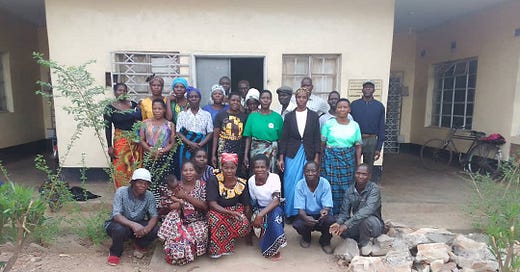Mikonga Cooperative Society Transforms Farmers' Lives Through Value Addition
Established in 2013 as a farmers group with 218 members, the cooperative aimed to create a unified market to strengthen their bargaining power on prices.
Mchinji, Malawi- In a bid to enhance profitability and secure a steady market for their farm produce, the Mikonga Cooperative Society has embraced value addition, bringing hope to its members and the Kapiri community, writes Gerald Fanuel.
The cooperative, which originated in 2013 as a farmers group with 218 members, aimed to secure a stable market and increase their bargaining power on prices.
The turning point came in 2017 when Churches Aid in Relief and Development (CARD) initiated the construction of a cooking oil processing factory.
After its completion in 2021, the factory became a beacon of hope for the cooperative members and the surrounding community. They were able to sell their produce and purchase cooking oil at lower prices.
Mary Martin, a member of the cooperative from Martin Village, T/A Dambe in Mchinji, expressed how the cooperative has transformed their lives.
Prior to its formation, farmers faced challenges such as low productivity, poverty, a lack of bargaining power, and inadequate market information.
"Before the formation of the cooperative, we faced low production, and our harvests were sold at low prices by vendors. We would later buy back the produce at higher prices due to the lack of steady markets and market information," said Martin.
However, Martin highlighted that now she is able to generate profits from selling her produce through the cooperative.
Additionally, she benefits from annual shareholder profit sharing, allowing her to support her family economically and educate her children.
"The cooperative has given us visibility and the power to influence market decisions. Farmers no longer need to search for markets; we have created our own market within the cooperative and the community," added Martin.
Efelina Andrew, another member from Biasi village, emphasised the access to loans provided by the cooperative, where the cooperative serves as collateral.
This visibility has enabled them to secure individual loans from the National Economic Empowerment Fund, fostering individual sustainability.
Yamikani Mafuleka, a member of the Mikonga Cooperative, summarised the benefits it provides to its members and the community.
"As members of the cooperative, we have diminished the power of vendors who acted as intermediaries between us and the markets.
In addition, by processing our produce into cooking oil, we add value and generate higher profits," said Mafuleka.
He also mentioned the knowledge and skills gained through frequent trainings conducted by various governmental and non-governmental organisations, enhancing their expertise in commercial agriculture and cooking oil production.
Speaking with Africabrief, Master Mtsindula, the managing director of Mikonga Cooperative, stated that the facility has the capacity to produce 21,000 litres of cooking oil per year.
However, he highlighted the lack of raw materials and capital as obstacles to increasing production to 70,000 litres annually.
Mtsindula appealed to well-wishers to support their endeavours, as their goal is to supply the entire country with cooking oil from their cooperative.
Village headman Ndakwa of Ndakwa village, one of the surrounding villages, expressed his delight with the Mikonga Cooperative.
"As the chief, I am delighted with the Mikonga Cooperative. Not only can we buy high-quality cooking oil at lower prices, but our children also acquire various skills and knowledge through the training provided at the facility," he said.
However, Mtsindula acknowledged that despite the cooperative's success, machinery breakdown remains a major challenge, leading to a year of inactivity in the past.
To address this issue, they applied for a matching grant in materials from the Agricultural Commercialization (AGCOM) project.
AGCOM has provided them with machinery and a two-ton transportation vehicle, which will reduce transportation costs and increase productivity by allowing them to source raw materials from distant locations.
The Mikonga processing factory was constructed by CARD with funding from Norwegian Church Aid.



